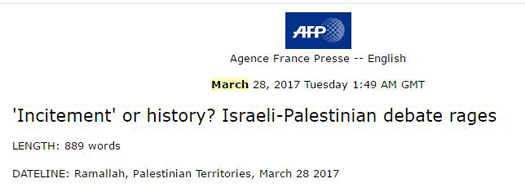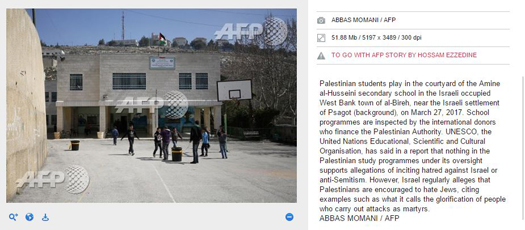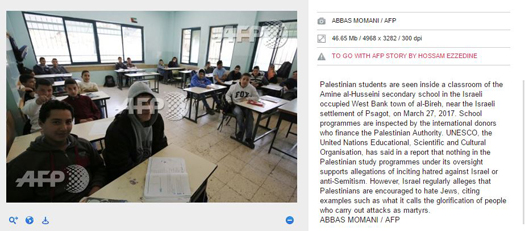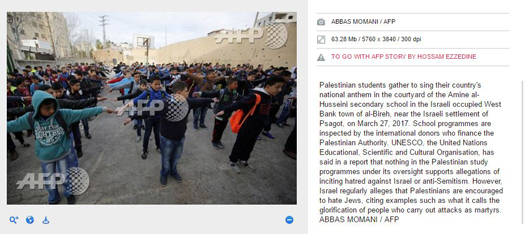Virtually devoid of concrete actual examples of incitement in the Palestinian school system, AFP’s article today “‘Incitement’ or history? Israeli-Palestinian debate rages” turns the phenomenon into a he said/she said debate, in which the Palestinian denial of incitement is afforded more credibility than the Israeli complaints about incitement.
Even the headline of the article signals to readers that Israeli concerns about incitement are not to be believed. While the headline puts “incitement” in scare quotes, it does not similarly qualify the word “history” with scare quotes.

Moreover, the lone concrete, specific example of incitement in the Palestinian school system is an relatively mild case: the naming of schools after Amin al-Husseini. The article begins:
At Amin al-Husseini secondary school in the occupied West Bank, with an Israeli settlement visible in the distance, singing the Palestinian national anthem is a daily ritual of student life.
For the Palestinians, Haj Amin al-Husseini, former grand mufti of Jerusalem, is the hero of a 1936 revolt against the British mandate over Palestine.
To Israelis, he was an ally of the Nazis and naming a school after him is an example of incitement to hatred of Israel and Jews.
One need not go back to a historic figure from the 1920s who fought the British (in addition to collaborating with Hitler) to find examples of schools named after Palestinians whose biggest claim to fame is killing innocent Israeli civilians. Three schools plus a kindergarten are named after Dalal Mughrabi, who in 1978 hijacked a bus and murdered 37 civilians, 12 of them children. Numerous schools are named after the terrorists behind the massacre of 11 Israeli athletes during the 1972 Munich Olympics: Salah Khalaf, Abu Jihad (Khalil Al-Wazir, who also planned the 1978 bus attack in which 12 children were murdered), and Ali Hassan Salameh. There are schools named for Ahmed Yassin, founder of Hamas, a terror organization according to the U.S., EU and Europe, and responsible for the deaths of hundreds of Israeli civilians. The list of dozens of schools named after Palestinians who carried attacks against hundreds of Israelis, including children, is available at
Palestinian Media Watch. The Abdullah Azzam School for Boys is named after the Palestinian co-founder of Al Qaeda and the Lashkar-e Taiba terrorist organization in Pakistan.
AFP does a great disservice by not including any of these examples which would enable readers to decide for themselves whether honoring these people by naming schools after them is a question of “incitement or history.” Including actual examples from the primary sources (ie, the texbooks), as opposed to accusations, denials and statements from secondary sources, would make a stronger article. But it also would make a stronger case for Israel’s well-founded concerns about the poisoning effect of Palestinian incitement.
Beyond the partisan headline which singles out “incitement” for scare quotes, the article further tilts towards Palestinian claims when it comes to providing actual empirical evidence to support the Palestinian claim “that it is the overall situation created by the occupation that fuels hatred rather than schools.” The article devotes several paragraphs to occupation, checkpoints, the security “wall” (though the vast majority of the barrier, which has greatly reduced terror attacks, is actually a fence), detours to schools, and destroyed schools in Gaza. AFP details, giving actual data: “In the Gaza Strip, ravaged by three wars since 2008, the last conflict in 2014 destroyed 24 schools and damaged 190 others.”
In contrast, AFP doesn’t cite the number (scores) of Palestinian schools named of attackers who murdered Israeli civilians. Nor does it mention the countless
camps and
athletic competitions named after Palestinian killers of innocent civilians. (In addition, while AFP reported that “[s]ome [Palestinian] students are forced to make wide detours to reach their schools due to settlements in the area,” but ignored the fact that
all Israeli schools must have security guards posted outside to protect against Palestinian attackers.)
Finally, AFP’s reliance on Sami Adwan, identified as a researcher in education sciences, who said he found that “instances of dehumanisation and demonisation of the other” are “rarely found” in Palestinian textbooks, is troubling. Significantly, the State Department initially funded his research but then did not back the composition of Adwan’s committee or the report’s findings. It’s no surprise why: according to critics, Adwan’s methods were extremely shoddy, ignoring the most egregious cases of Palestinian incitement in textbooks. Indeed, journalist Adi Schwartz
charges that Adwan’s study:
simply ignores passages from Palestinian textbooks that are breathtaking in the danger they represent in an educational context, citing texts like the following, found in standard Palestinian textbooks:
God’s Messenger said: “The Hour of Resurrection will not come until the Muslims fight the Jews. The Muslims will kill them, and when a Jew would hide behind a rock or a tree the rock or the tree would say: O Muslim, O worshipper of God! There is a Jew behind me; come and kill him!”
A recent report published by IMPACT-SE documents more examples: A sixth-grade Palestinian textbook says, “The Messenger of God [Muhammad] ordered to Zayd Ibn Thabit to learn the language of the Jews in order to be safe from their cheating.” An eighth-grade textbook says, “Your enemies killed your children, split open your women’s bellies, held your revered elderly men by the beard, and led them to the death pits”—a quotation dismissed by the committee because it did not explicitly mention Jews or Israel. Yet another textbook, for grade 12, says, “By your life! How come that snakes invade us and we [still] observe a protection covenant [dhimma] which respects commitments?”
But AFP failed to cite any of the aforementioned hard examples, opting instead for secondary sources like UNESCO, which “said in a report that nothing in the Palestinian study programmes under its oversight supports charges of inciting hatred against Israel or anti-Semitism.” Any of the above examples would give readers fir
sthand information to belie UNESCO’s statement.
The series of captions accompanying the AFP photographs that illustrate this story likewise rely on UNESCO, a secondary source, instead of the textbooks themselves. Below is a sampling of the captions regarding students of
the Amine al-Husseini secondary school in the Israeli occupied West Bank town of al-Bireh, near the Israeli settlement of Psagot (background), on March 27, 2017. School programmes are inspected by the international donors who finance the Palestinian Authority. UNESCO, the United Nations Educational, Scientific and Cultural Organisation, has said in a report that nothing in the Palestinian study programmes under its oversight supports allegations of inciting hatred against Israel or anti-Semitism. However, Israel regularly alleges that Palestinians are encouraged to hate Jews, citing examples such as what it calls the glorification of people who carry out attacks as martyrs.



Imagine the better, more fact-based understanding that news consumers would have received had AFP photographed one of the several Dhalal Mughrabi schools, informing readers that the school’s namesake murdered 35 Israeli bus passengers, including 12 children. But with words and pictures, AFP instead covers up the truth, referring to Israeli “allegations of inciting hatred against Israel or anti-Semitism” and citing unspecificied examples of what Israel “calls the glorification of people who carry out attacks as martyrs” (emphasis added.)




